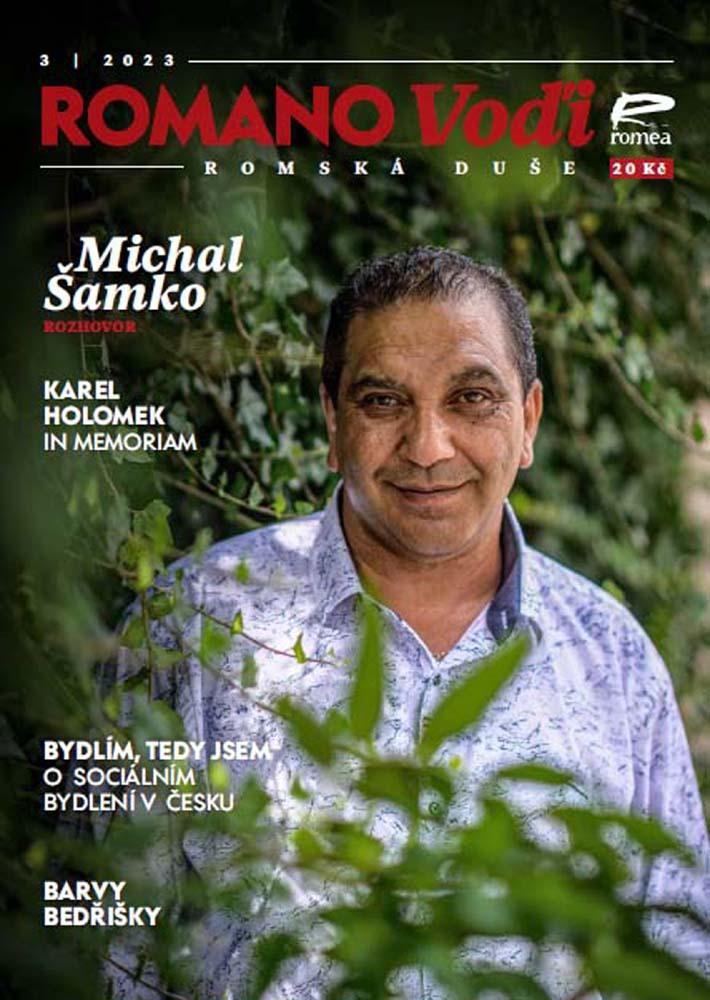The Czech Republic is creating yet another generation condemned to poverty, says activist from the Platform for Social Housing
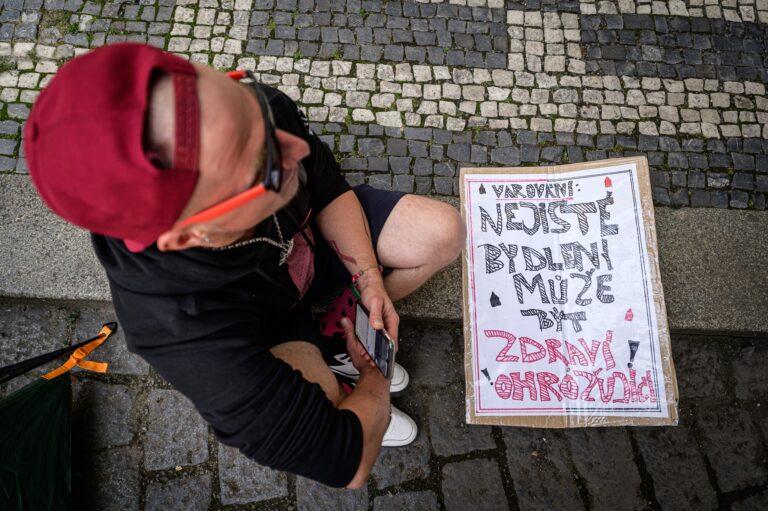
Over the decade of existence that the nonprofit organization called the Platform for Social Housing is marking this year, it has come a long way in the Czech Republic. In the beginning, according to its chair and co-founder Jan Snopek, the NGO was considered a dangerous, radical group, not just by many state officials, but also by others in the nonprofit sector.
Today the organization is an important player in the social housing field, and its Housing First approach advocating dignified housing for the most vulnerable is beginning to develop in many locales throughout the Czech Republic. “The Platform, as part of a wider initiative called ‘For Housing’, has created the ‘skeleton’ of a bill for housing support and delivered it to the Ministry for Social Affairs and to the Ministry for Regional Development, and we have also contributed to consultations and the legislative commenting process,” Snopek explains.
“From the very start we’ve been saying the same thing we’re saying now. Back then we were basing our arguments on an approach that was considered progressive, abroad, and that was evidence-based. Many of our critics, despite the fact that they have done a great deal of important work here, have become a bit ‘stuck’ in how things were done in the 1990s – in an approach that even back then was rather outmoded in comparison with how social housing is approached abroad,” he relates.
The Housing First approach, the dissemination of which is supported by the Platform for Social Housing, arose at the beginning of the 1990s in the USA and gradually started spreading through Europe. It started from the assumption that homeless people are able to solve their own problems once they have a safe place to live and privacy.
The approach has proven quite successful, as most people have proven to be not only capable of keeping their housing, but with the aid of social workers they frequently managed to slowly get back on their own two feet. They have recovered from their psychological problems, or their addictions, becoming able to begin establishing healthy relationships with others, and to find jobs.
Homelessness is not just about living on the street
From the beginning, the Platform has worked as a watchdog organization. “At one moment a Concept for a Comprehensive Solution to Social Housing turned up here that did not at all count on social apartment units for the provision of social housing. The appropriate solution was considered the residential hotels,” Snopek describes the situation in 2013.
Homelessness is not just about extreme situations, such as people who live on the street. It also concerns those who dwell in shelters and in the residential hotels, persons hospitalized in psychiatric treatment facilities, or prisoners who have nowhere to go after departing institutions.
The term “housing shortage”, which is part of homelessness, also includes those living in rental apartment units that are unfit for human habitation because there is no access to electricity or running water in them, or those at risk of losing their housing who live in precarity. “We knew the residential hotels were not the right solution. We had familiarized ourselves with the situations in the residential hotels in the Czech Republic and we knew the studies about this from abroad. Those studies showed that even though the residential hotels in our country were maintained at a better standard – they weren’t infested with mold or insects, they weren’t as large, they didn’t involve shared toilet facilities for as many households – there were still many reasons why they were inappropriate for creating homes. Last but not least, they involve segregating the socially weak away from everybody else,” Snopek explains.
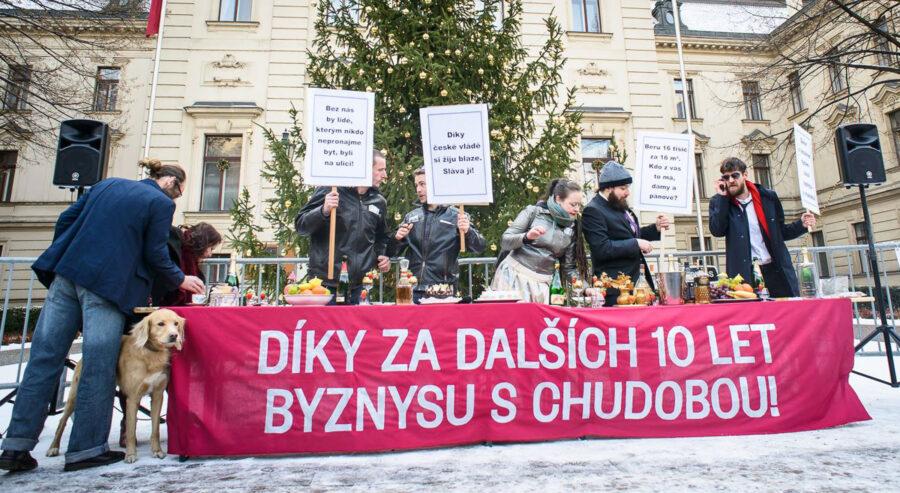
(PHOTO: Petr Zewlakk Vrabec)
According to the Report on Housing Exclusion for 2021 published by the For Housing initiative, which also includes the Platform for Social Housing, approximately 10 % of the population in the Czech Republic has housing problems. The report was published even before the crisis on the energy market and the growing inflation that people in the Czech Republic face today.
Experts predict the current percentage today of those with housing problems in the Czech Republic will be even higher than 10 %. From the initiative’s other publication in 2022, Solving the Energy Crisis, it follows that even before the recent sharp rise in energy prices, 910,000 inhabitants of the Czech Republic were living in energy poverty.
Families with minor children are most impacted by such poverty. Approximately 10 % of children in this Central European country were already living in energy poverty in 2021.
“It is exactly families with minor children who belong to the group of those most at risk. Many children are not being born into dignified conditions,” the director of the Platform, Barbora Bírová, says.
...families with minor children...belong to the group of those most at risk.
“In the area of education, data has been documented showing that if children grow up in housing conditions that are poor, whether that means they are overcrowded, or of very poor quality, or in precarity, that has a negative impact on their school attendance and achievement. Those children’s failures in primary school influence the entire rest of their lives. That’s an impact the Czech state should take very seriously, because yet another generation of people is being created here who are condemned to live in poverty on the outskirts of society,” Snopek adds.
The initial successes of Housing First
A watershed moment for the Platform and its efforts to advocate for the Housing First approach in the Czech Republic came about thanks to the support of the individuals, the local politicians and municipal departments which were inclined toward that approach after the Live Brno (Žít Brno) movement won the local elections there in 2014. “They contacted the Platform and said they wanted to create a policy on social housing. We designed, together with the City of Brno, the IQ Roma servis nonprofit organization and Ostrava University, a project called Rapid Rehousing. A lottery was used to randomly select 50 families with minor children who were facing housing shortage, and the city gave them access to 50 municipally-owned apartments. After one year the impact of the program on the accommodated families was assessed. The findings from abroad were confirmed for the approach here too, housing provision aids people with developing positively in other parts of their lives,” Snopek explains.
The European Commission noticed the project’s success and visited Brno to see it in person, then decided the European Social Fund would allocate resources for a special call focused on rolling out Housing First. That call closed last year after supporting 13 projects by municipalities and nonprofit organizations, and two new calls are continuing the project, which have supported a total of 41 projects for social housing in the Czech Republic.
Marian
Since 2019, the Housing First project has been implemented by the Ledovec (Iceberg) nonprofit organization in Plzeň, which is dedicated to mentally ill people and is also a member of the Platform. “Currently we have housed 27 households, most of them individuals. However, we are aiming for a minimum of 35 apartment units,” explains Ledovec’s director, Petr Moravec.
“Stable housing, a place to call home, is quite an important factor for people who have experienced mental illness being able to set out on their recovery journey,” the director emphasizes. One of the Housing First clients helped by the Ledovec organization is Mr. Marian (age 61).
We visited him in an apartment building on the outskirts of Plzeň together with Jiří Frýbert, a member of the Housing First team at Ledovec. Frýbert plans to assess Marian’s situation after two years of residing there, and he is bringing him some gifts as well: a little bed for his cat and a couple of DVDs.
Inside the clean, repaired apartment building provided by the City of Plzeň for use as social housing, we enter the apartment unit’s narrow hallway. Marian, who is comfortably dressed, welcomes us.
He extends his hand in greeting. “Look out for Micinka,” he says.
We step inside quickly and shut the door so his tabby cat won’t escape. We walk through the clean, neat unit with its big windows and view of the greenery outside.
“I’m all right now,” Marian summarizes his current situation. Two years ago, the Ledovec organization found this social apartment for him.
Ever since then, Marian, who has spent most of his life in psychiatric treatment facilities, residential hotels or shelters, has seen his life transform for the better. He proudly shows me the framed photographs he has put up in his kitchen.
In the snapshots, Marian is laughing with his new friends from the KFC where he is working. “So, shall we fix that frame?” Frýbert asks him, and gets to work.
Once the frame is repaired, a Freddie Mercury poster is put back in it and hung above the bed. Marian got the poster from Ledovec two years ago when he moved in because he loves the band Queen.
“We want our clients to feel at home in these units, as much as possible,” Frýbert explains. Little gestures like this are part of his work.
“Has the nurse already been by?” Frýbert asks. She visits to make sure Marian is taking his medication.
For now, Marian has been assigned a guardian – a social worker from the local authority. That person takes care of his finances as long as it is clear he is unable to manage the budget for his own household.
One condition of Housing First is that those who are housed pay for their own housing. “I would like to take care of my own money myself,” Marian admits.
Marian says he believes he could handle that now. In the meantime, Micinka has climbed on his lap and is purring with satisfaction.
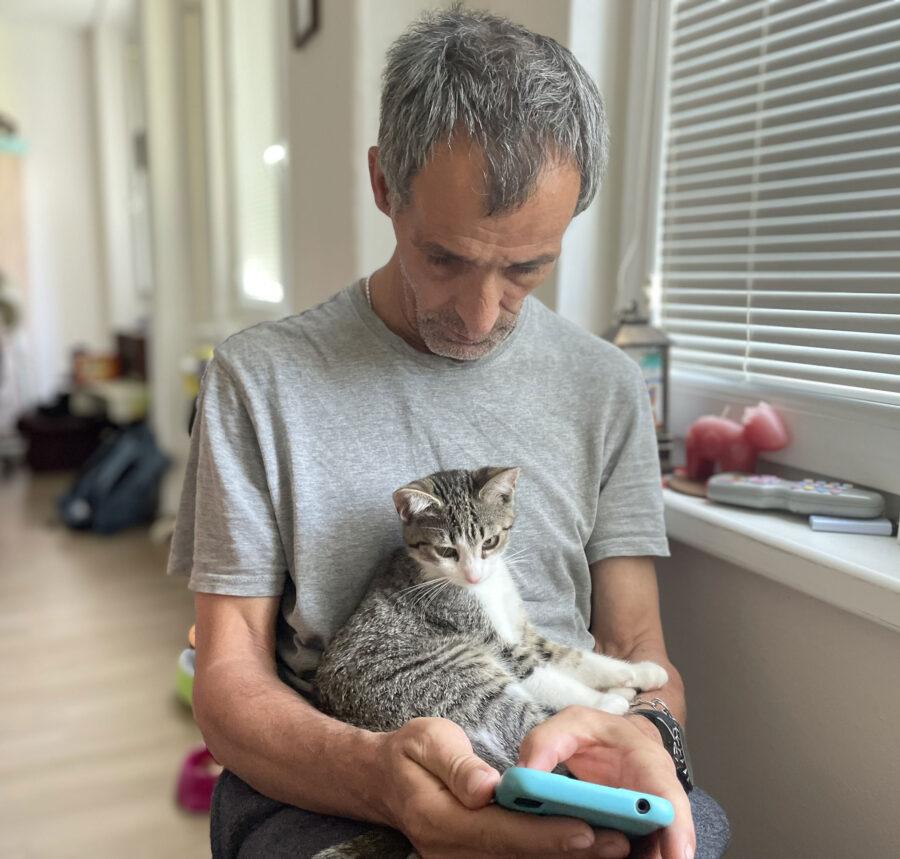
The cat jumps down when the doorbell rings. “That’s my friend,” Marian explains.
The friend has come for a visit and they will watch a film together. Marian has a cabinet full of DVDs and old video cassettes.
One movie is already playing on the television in the background. Marian has made friends with his neighbors in the building.
In the building’s club room he even celebrated his 60th birthday with his neighbors last year. However, once we discuss his childhood and his past, the comfortable feeling quickly vanishes.
Marian grew up in northern Bohemia and left home at the age of 15. He said his brothers used to beat him and bully him in a very ugly way, even shooting at him with an air gun.
His parents drank. Marian moved to Karviná to apprentice as a miner.
He has been married more than once and has four daughters. All of his marriages collapsed and his daughters were put up for adoption when they were very little.
Marian had not heard anything about his children since then. However he did meet one, Lucka, after many years when she looked for him through the “There’s Mail for You” television program.
“This is Petra,” Marian says, joyfully showing me a photo on his smartphone of his granddaughter. He has stayed in contact with Lucka and they see each other regularly.
Before we leave, Marian tells us that he would like to find a partner so he doesn’t have to live alone. He would also like to get a bicycle so he doesn’t have to rely on the buses when he works the night shift.
We say goodbye and Frýbert and Marian agree he will come to assess the housing later. There wasn’t any time to do it during all the conversation with me.
Václav
We return into town by trolleybus and go to the building where the Housing First program is headquartered at Ledovec. Another client, Mr. Václav (age 54), comes to meet us there.
He takes a seat in an armchair and sets aside the crutches he has been using. I notice an obvious scar on his head and several more on his left leg, with which he has the biggest difficulty.
Václav lived for a long time in a tent beneath a bridge, and even though he has only been in his own social apartment since May, he says he could not survive a return to life on the street. Fate has not been kind to him either.
His life fell apart many years ago, in 1987, when he crashed an ambulance he was driving. He spent the next four and a half years in hospital.
Ever since then, he has been on disability and has difficulty walking. He has lived in a caravan, in residential hotels and in a tent, and most recently lived in a small disused building at a railway station without electricity or water.
In order to bathe, he visited the Plzeň reservoir, even in the winter. His dog Gino, a cross between an Alsatian and a golden retriever, was the only thing literally keeping his head “above water” in those days.
He heard about Ledovec from a friend recently. “When we met, he was making a living distributing fliers,” Frýbert recalls,
Ever since Václav sought aid from the Ledovec staffers, his life has been transformed – now he has an apartment and has even found a girlfriend. “The most beautiful thing about this project is that you see immediate results,” Frýbert points out.
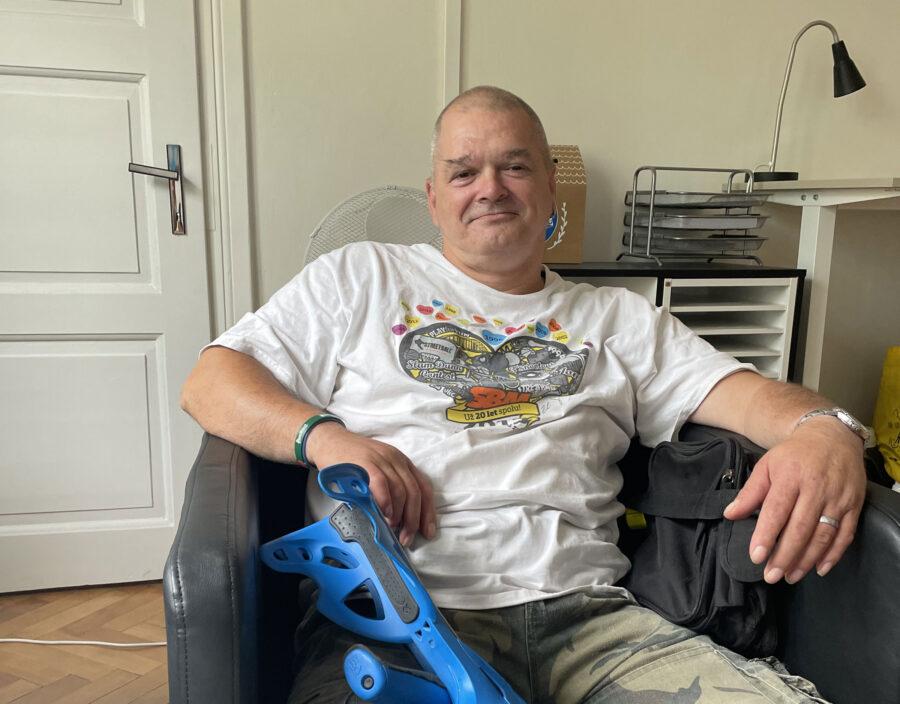
A law on social housing is necessary
Marian and Václav are living in municipally-owned apartments where people, according to Frýbrt, pay much lower rents than on the regular market. However, the condition for being awarded such a unit is that the client cannot already be in arrears with the municipality.
Municipalities do not have enough apartment units of their own to meet the demand. After the extensive privatization of the 1990s, in the Czech Republic, unlike in other EU member states, most apartment units are in private hands.
The EU average with regard to the proportion of social units available in the housing stock is 8 %, exceeding 20 % in countries like Austria or Denmark, but in the Czech Republic it is just 0.5 %, according to economist Pavlína Žáková.
The law has the potential to reduce the number of persons affected by housing shortage by at least 30 % over the next 10 years.
Snopek says social housing has to run under the auspices of the law that the Platform has been striving to get adopted. “Legislation is necessary, and we need more than just those who are enthusiastic about this to be involved in it,” says Platform director Bírová.
The law has the potential to reduce the number of persons affected by housing shortage by at least 30 % over the next 10 years. It came the closest to being adopted in the year 2017, reaching a first reading in the Chamber of Deputies.
Currently a bill is being submitted by the Ministry for Regional Development together with the Labor and Social Affairs Ministry and it should be discussed by the Government by the end of this year. If all goes to plan, the new law would enter into force in mid-2025.
This new law will not be called a “social housing law”, as the one in 2017 was, but will be called a law on housing support. “If one says ‘social housing’, most people imagine Romani families. I believe it can be said that the leadership of some municipalities is openly xenophobic,” Snopek explains the name change.
“Some opinions also exist that this law might provide support to people who are undeserving of it. However, we reject that prediction, we believe it is necessary to offer a helping hand to everybody, irrespective of how bad of a situation they are in. These people are unable to extricate themselves on their own and that fact is a complication not just for them and those around them, but for all of society. For their children, too. The children decidedly are not to blame, and to condemn them to live in a residential hotel means it will have a negative impact on the rest of their whole lives. That has been confirmed by research,” Snopek says.
According to Jan Milota from the IQ Roma servis organization, one of the founding members of the Platform that was behind the Rapid Rehousing project, the law is important so that changing the situation doesn’t have to depend on local political leadership. That is what happened in Brno.
The rental contracts with the city were concluded just for one year there, and the city’s political leadership changed in the interim. The new leadership was not inclined toward Rapid Rehousing, so many people lost their housing.
Currently the housing question is being addressed on the local level only. “We have 6,253 municipalities in the Czech Republic, that means 6,253 different apartment use policies that can change every four years depending on the elections,” warns David Šlouf, a city council member in Plzeň, the first city in the Czech Republic to push through a Concept on Social and Affordable Housing.
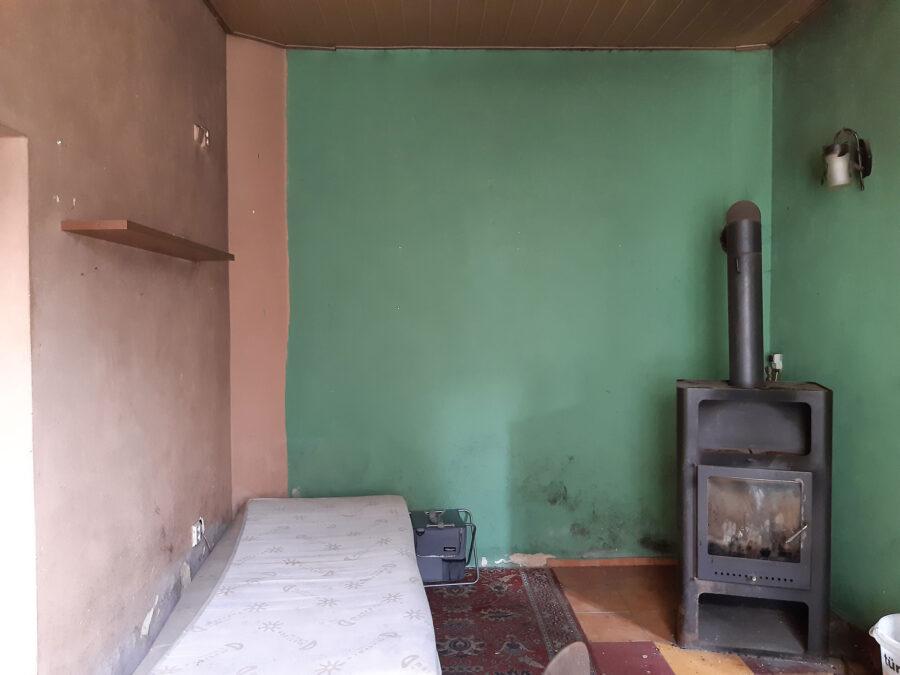
Discrimination is part of the problem
Jan Milota mentions that Romani people are most frequently affected by the housing question. He gives the example of contacting 240 landlords for one Romani family and looking at 80 different units over the course of nine months, without success.
“The level of discrimination here is enormous. In Brno a Romani family will not be able to rent an apartment, or will only be allowed to rent one in an excluded locality. Romani people in the Czech Republic are frequently excluded from all spheres of life. Their children attend the segregated schools from which they have no opportunity to move on to a better school. More and more generations are growing up here who don’t see a satisfactory future for themselves,” Milota explains.
Inequality of opportunity with regard to housing as a result of discrimination should be covered by the Act on Housing Support as well. If adopted, municipalities with expanded scope will be obliged to set up contact points for housing.
People facing housing shortages will be able to turn to them for aid. The contact points will maintain databases of social apartment units, both municipally-owned and privately owned, and landlords will receive guarantees when they make their units available for social purposes.
The owners will be guaranteed, for example, to always be paid their rents and for the cost of repairing any damage to be remunerated. Social workers will do their best to aid specific applicants according to their needs, whether that has to do with assisting them with securing a housing contribution, help with finding jobs, aid during disputes with neighbors, etc., – and the municipalities will get money from the state for these contact points.
Who will pay?
The negative impacts cost us billions as a society and influence the education of thousands of children...
“The annual budget for applying the Act on Housing Support will total one and a half billion crowns. Naturally voices are being heard saying that’s an awful lot of money, but according to an analysis, after five years of higher investment, the measures will yield savings. People will be better off and money will be saved on other expenditures, for example, the running of some social services, or the cost of children being in institutional care,” Snopek explains.
According to a study by the J&T Foundation, lack of adequate housing is one reason children are placed in orphanages, 48 % of the time. Minister for Regional Development Ivan Bartoš agrees.
“The negative impacts cost us billions as a society and influence the education of thousands of children, the mental and physical health of tens of thousands of adults, and naturally project themselves into the increased risk of pathological phenomena in society. All of that is then projected into economic costs,” the minister said on the For Housing initiative’s website.
Currently the Platform’s projects are covered almost exclusively from EU funds; in addition to support for spreading the Housing First approach, this includes education and outreach on the question of ending homelessness. “If it weren’t for the EU, we wouldn’t be able to do even a fraction of what we are doing,” Snopek says.
The case of Přednádraží
The Platform was symbolically set up in May 2013 during a meeting in the excluded locality of Ostrava-Přednádraží. “There was a sewer line that broke and dozens of families were moved away from there. We went there to support the residents and at the press conference that we held, we announced we were establishing the Platform. We presented our constitutional declaration there, which we still have to this day. The main demand was the adoption of the Act on Social Housing,” Snopek recalls.
In the beginning the Platform had just nine members, a few organizations and individuals, but today it has about 120 members, half of which are organizations. The rest are experts, individuals, and people who have experienced housing shortage.
Currently the Platform is no longer considered to be a bunch of dangerous radicals by Government bureaucrats, but the pivotal co-creators of the new law. Snopek considers that to be the biggest success of the Platform.
“We also brought the Housing First approach to the Czech Republic and managed to spread it here to such a degree that it is an established, genuinely widespread approach. In the beginning people couldn’t believe it would ever work,” Snopek says with a smile.
First published in Czech in Romano voďi magazine.
